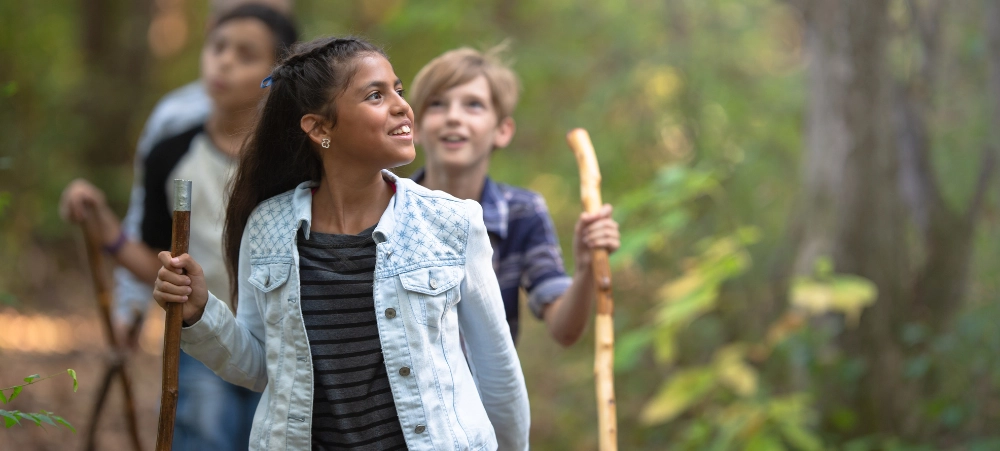In recent years, there has been a growing focus on the importance of outdoor learning and its positive effects on child development. As technology continues to dominate daily life, the value of nature-based education becomes increasingly evident. Outdoor learning provides children with unique opportunities to develop essential physical, cognitive, and social skills, all while fostering a deep connection with the natural world. Here’s a closer look at the benefits of outdoor learning for children.
1. Physical Health and Well-Being
Spending time outdoors is closely linked to improved physical health. Research from the American Academy of Paediatrics highlights that outdoor activities promote cardiovascular health, boost the immune system, and help combat childhood obesity. Nature-based learning environments encourage children to engage in active play, from climbing trees to running around, which improves motor skills, builds strength, and enhances coordination. Additionally, outdoor exposure to sunlight increases Vitamin D levels, which are essential for bone health and immune function.
2. Enhanced Cognitive Development
Outdoor learning environments have been shown to improve cognitive function and academic performance. According to studies published by The American Journal of Public Health, children who spend more time outdoors tend to score higher in reading, mathematics, and science. Nature-based experiences engage multiple senses and stimulate curiosity, leading to a deeper understanding of the world around them. Outdoor learning often involves hands-on activities, such as planting a garden or studying ecosystems, which promote problem-solving, critical thinking, and creative exploration.
3. Emotional and Mental Health Benefits
The natural environment has a calming effect on children, helping to reduce stress and anxiety. Research from The University of Essex shows that outdoor activities, especially in green spaces, help lower cortisol levels and promote positive emotions. Being surrounded by nature helps children develop resilience and improves their ability to cope with challenges. Outdoor learning also fosters a sense of well-being by providing children with a break from the structured, sometimes overwhelming, classroom environment. Nature offers a sense of freedom, allowing children to explore at their own pace and engage with the world without the pressures of schedules or expectations.
4. Social Skills and Teamwork
Outdoor learning environments often encourage collaboration and teamwork. Whether they are working together to build a shelter, navigate a scavenger hunt, or care for a community garden, children learn to communicate, negotiate, and support one another. According to The National Association for the Education of Young Children (NAEYC), outdoor learning helps children develop stronger social skills and enhances their ability to interact positively with others. They also learn how to resolve conflicts independently, which strengthens their emotional intelligence and interpersonal relationships.
5. Fostering a Connection with Nature
One of the most significant benefits of outdoor learning is the development of a lifelong connection to the environment. According to The Children & Nature Network, children who regularly engage in outdoor activities are more likely to care about environmental conservation and sustainability. Nature-based education fosters an appreciation for wildlife, ecosystems, and the planet’s natural resources. As children experience the beauty and complexity of nature, they become more attuned to environmental issues and are motivated to protect the world around them.
6. Improved Focus and Attention
Nature has been shown to improve focus and attention in children, especially those with ADHD. A study conducted by The University of Illinois found that children who engage in outdoor activities in green spaces have better attention spans and can concentrate more effectively. Nature’s calming effect and the lack of distractions found in traditional classroom settings allow children to focus better, leading to improved behaviour and academic performance.
7. Encouraging Creativity and Imagination
Outdoor settings provide endless opportunities for imaginative play. Nature’s open spaces allow children to use their creativity to invent games, tell stories, or explore new ideas. The Center for Universal Education highlights that outdoor learning nurtures curiosity and imagination, as children are encouraged to explore their surroundings without the limitations of indoor spaces. From pretending to be explorers in the jungle to imagining themselves as animals in the wild, outdoor environments allow children to engage in self-directed, imaginative play that fosters cognitive flexibility and creativity.
8. Promotes a Growth Mindset
Nature-based learning often involves trial and error, where children are encouraged to take risks and learn from their mistakes. This process fosters a growth mindset, where children understand that effort and persistence lead to improvement. Whether it’s learning how to balance on a log or navigating a challenging obstacle course, children learn the value of perseverance and developing resilience in the face of challenges. The American Psychological Association notes that these experiences contribute to emotional development and help build confidence in a child’s abilities.
Conclusion
The benefits of outdoor learning are extensive, offering children the opportunity to develop essential life skills while fostering a deeper connection to nature. From improving physical health to enhancing cognitive abilities, social skills, and emotional well-being, outdoor learning offers a holistic approach to child development. As educators and parents, encouraging children to spend more time outdoors is one of the most effective ways to nurture their growth and set them on a path to lifelong success.
Sources:
- American Academy of Pediatrics, “The Importance of Outdoor Play”
- The American Journal of Public Health, “The Impact of Nature on Cognitive Development”
- University of Essex, “The Effects of Nature on Mental Health”
- The National Association for the Education of Young Children (NAEYC), “Outdoor Learning: An Essential Part of Early Childhood Education”
- Children & Nature Network, “The Benefits of Nature-Based Education”
We understand that there are many aspects that encompass a Mother, Father or Child and strive toward providing resources and services that accommodates this.
Our content is aimed to inform and educate families on issues starting from pregnancy through to the challenges of the teen-age years.
- Tiny Toons Looniversity Returns: Meet the Voice Behind Plucky and Hamton! - December 12, 2025
- From Pain to Possibility: Panado®’s New Marketing Campaign, Highlights The Joy Of Pain Relief - December 10, 2025
- Feeding Unicorns by Jeni-Anne Campbell: A bold new book for business leaders who care - December 9, 2025





